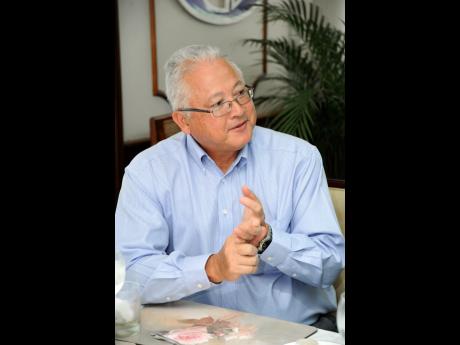Chuck vows to fix problems facing judges
Minister of Justice Delroy Chuck has vowed that the many complaints of the nation's judges over the years will be addressed shortly as part of efforts to improve the country's justice system.
According to Chuck, he is aware of the concerns of the judges and he is going to implement measures to deal with them.
"There are a number of complaints given by the judges that they are over-worked, they don't have secretarial support and judicial clerk support," Chuck told The Sunday Gleaner.
According to Chuck, he believes that enough judicial clerks have now been provided for the judges so that should no longer be an issue.
The Supreme Court has 32 appointed judges, and Chuck noted that although there is provision for a complement of 40 judges a lack of space has prevented the additional appointments.
He is adamant that the other eight judges must be appointed to ease the workload of the judges and help them expedite judgments while reducing the backlog of cases.
"Over the next few months, the Ministry of Justice will be working with the chief justice to reconfigure several areas at the Supreme Court to provide additional judges' chambers so that the full complement of 40 judges can be appointed to ease the burdens on the judges," said Chuck.
The Court of Appeal which has seven judges is to get an additional five judges, and Chuck said that will be a reality within the next 12 months as he is expecting to hand over the accountant general's building in Justice Square to the Court of Appeal so that there will be additional space for judges' chambers.
In relation to a list of long-outstanding judgments published by the Jamaican Bar Association, Chuck said the chief justice has been in touch with those judges and it is hoped that by the end of this month the majority of these judgments will be delivered.
According to the justice minister, at the end of September there is going to be an assessment of judgments which are outstanding for more than six months.
"I have met with some of the judges and there is no doubt the vast majority of them are working speedily to deliver the judgments," said Chuck, as he argued that many of the nation's judges are delivering their judgments on time.
INTERNATIONAL STANDARD
The international standard for delivery of judgments is one to three months, and Chuck said he will be doing everything in his power to provide the support the judges need so that the international standard can be respected and complied with.
"Until the Government is able to give them the full support, I expect judgments to be delivered within six months," said Chuck.
He told our news team that he has prepared Cabinet submissions to amend the Constitution so that retired judges can be utilised on a needed basis in the courts.
For years, judges have quietly complained that they are overburdened and there is the need for persons to be appointed to the Bench.
"The judges have been in the spotlight these days about outstanding judgments, but no one is talking about our very heavy workload," one judge told our news team last week.
"Many people do not realise that judges do not have a social life because they spend most of the days in court or doing matters in chambers so that judgments can only be written at home in the nights," added the judge, who pointed out that only a few members of the Bench are tardy in handing down judgments.
"It might not be feasible to hand down all judgments within six months but efforts are now being made to hand down oral judgments after the cases have been completed," said the judge.
"People must not forget that Jamaica has a very high crime rate, and in addition to that our society is more litigious these days," said the judge, who underscored that since 1967, there has been no increase in the seven-member panel in the Court of Appeal.
"The Government also adds to the delay because when they pass laws that are unconstitutional, three judges have to sit to determine the issue.
"All I am hearing about is output and judgments must be handed down within a certain time frame, but where are the resources to assist us?" questioned the judge, who noted that in the Cayman Islands judges are given time out of court to read and write judgments.
"My wife says I am married to my job, and I have no opposing argument because when I am at home most of my time is spent in my study, reading case files, researching cases and writing judgments," one judge argued.
CASES DISPOSED OF
Since 2006, the Supreme Court has seen between 7,000 and 8,000 civil cases filed annually, with about eight to 10 per cent of them disposed of each year.
The 2015 Economic and Social Survey of Jamaica, published by the Planning Institute of Jamaica, reports that with 1,388 appeals carried forward from previous years and 253 new appeals filed, the total caseload heard by the Court of Appeal was 1,641.
Of this, 56.8 per cent was related to civil matters and 42.5 per cent criminal matters. A total of 1,456 cases (1,244 traversed and 212 new) originated from the Supreme Court and 185 cases (144 brought forward and 41 new) originated from the Resident Magistrates' Court.
At the end of the year, 1,472 appeals remained pending.

